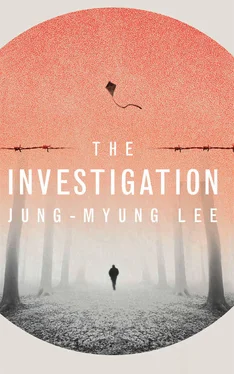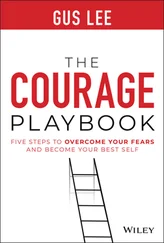The following week the familiar blue kite flew up over the prison walls as the prisoners watched with bated breath. The blue kite circled, jostling for a fight. Dong-ju quickly reeled his kite in.
‘Why are you avoiding it?’ Sugiyama glared at the fragile young man, who resembled the kite made of thin paper and bamboo. ‘Fight till the end!’
Dong-ju thought for a moment before unspooling the kite line. His kite rocketed up. The blue kite followed, its tail swaying. The blue kite changed direction and approached. Dong-ju gripped the spool. The thin kite lines cut into his palms. The blue kite blocked the wind and came close, and Dong-ju’s kite stumbled. The spectators let out a groan. The wind billowed again. Dong-ju’s kite swooped and circled the blue kite a few times. Now, even if the lines were cut, the two kites would fall, bound together. Suddenly, with a tug, the taut kite line sagged; the blue kite had clipped the white one’s line. Dong-ju’s kite flew on for quite a while before sinking slowly, the blue kite descending along with it. Dong-ju quietly wound in the line. The men murmured in the yard; there was a smattering of cheering and applause.
‘These guys never cared about winning,’ Sugiyama said with a faint smile, nodding over at the yard. ‘They just wanted the kite to go beyond the walls.’ Sugiyama kept looking at the descending kites in the distance.
Dong-ju imagined himself looking down at the ground from the sky, down at the vast ocean, the endless sea-foam coasting in with each wave, the port twinkling in the sunlight, the workers on deck, the children flying their kites, and the wooden guard post, in front of the large dome of the main ward, glistening brassily in the setting sun. Perhaps now he’d be able to write again.
Every Tuesday Dong-ju flew the kite in the prison yard. Through the slender line, he sensed the girl on the other side of the wall — her pink cheeks, her firmly closed mouth. The goal wasn’t to win, but to see how long he could endure. The blue kite seemed to cross lines, not to fight but to engage in conversation. When Dong-ju unspooled more line, the girl did too, and when he reeled it in, she did as well. When Dong-ju’s kite staggered, the blue kite tugged at its line to give it wind. The two kites crossed lines and detached, reeled down and went back up and teased each other. They approached and stepped back, tangled and fell. If Dong-ju’s kite spiralled down, the blue kite flew up, spinning in the opposite direction. If Dong-ju’s kite flew sluggishly, the blue one dragged along with it. Their beautiful dance embroidered the clear sky. A gust of wind would carry Dong-ju’s kite far away, and the prisoners watching would feel better, imagining their dreams flying far away with it. The two kites’ solemn waltz was the only beautiful scene at Fukuoka Prison.
Sugiyama stood against the cold brick wall. He took out a worn piece of paper from his inner pocket and opened it. Winter sunlight fell onto his clumsy handwriting:
In the bronze mirror stained with blue rust
my face remains so disgraced
A relic of which dynasty?
Each word beaded in his heart. Dong-ju’s skeletal form blocked the sun. Sugiyama looked up, carefully folding the piece of paper and sliding it back into his pocket.
‘Why do you have that poem?’ Dong-ju demanded.
Sugiyama didn’t know what to say. As he was the one who’d burned Dong-ju’s poems, he couldn’t tell him that the poem had healed his battered heart. He couldn’t confide in Dong-ju that, when he read the poem, he felt as though he’d found something he’d been desperately searching for. He felt that he was the only person who could save the young man’s poems; he’d begun memorizing them hungrily, reading as though he were praying, reciting them to himself reverently, fingering the copies deep in his pockets.
‘Since these poems helped me, they could help many others,’ Sugiyama managed to reply. ‘I know they could make everyone feel better.’
Dong-ju closed his eyes. He could hear crows flapping their wings on top of the poplar trees. His face seemed to be made of thin ice about to shatter. ‘It’s possible that the book of poems is still around.’
Sugiyama’s eyes gleamed. If a copy of the manuscript was intact somewhere, the poems would be, too. His guilt could lessen. He grabbed Dong-ju’s shoulders and shook them. ‘Where?’
Dong-ju gazed up at the empty sky. ‘I don’t know. They left my hands a long time ago.’

During Dong-ju’s time at Yonhi College, he wrote poems fervently, read books and listened to music. He spent his afternoons going on pilgrimage to used bookshops and music cafes, and on his return to the dormitory he stayed up all night reading. His shabby bookcase was stuffed with literary magazines and books. Between the pages he dried perfect leaves he found on his walks, writing down the place and date he found them. In those days, everything glistened with possibility.
But he wasn’t spared the cruel clutches of war. The four years he spent in Seoul were harsh and ruthless; young men were dragged off to war and the citizenry was impoverished by the allocated collections for war goods. He had to leave the dormitory and move into a boarding house run by the novelist Kim Song, blacklisted by the Special Higher Police. Kim’s boarders were targets of inspection; detectives watched the students’ every move at all hours of the day. Like clockwork, they burst in every evening to scribble down the students’ book titles and confiscate letters from their desk drawers. Dong-ju packed his bags again, but there was no place for him to go. No matter where he went, he wasn’t safe from brutal restriction and watchful eyes. Several of Dong-ju’s friends were conscripted, a red band tied around their tonsured heads; others were brought into the police station, beaten within an inch of their lives and sent to prison. For Koreans, there was no future. Every night Dong-ju sat before his tiny desk and threw himself into the darkness. Unfinished poems piled up, along with crumpled, discarded pieces of paper smudged with eraser marks and slivers of words.
With graduation looming, Dong-ju made three copies of a manuscript containing nineteen poems. He asked his friend Jeong Byeong-uk to safeguard one copy, kept one for himself and took the final copy to his professor Lee Yang-ha. He explained his desire to publish a couple of dozen copies and asked Professor Lee to write a foreword. His mentor shook his head; the book of poems would be considered seditious. The Special Higher Police detectives would bare their teeth if they saw poems like ‘Cross’, ‘Sad Tribe’ and ‘Another Home’. Professor Lee suggested that they wait for a better time.
‘When would that be?’ Dong-ju asked.
His mentor couldn’t give him an answer.
Dong-ju wondered if such a day would ever come, and whether his nineteen poems would survive until the day the world changed.

‘Are you saying that there are two more copies of the manuscript in Korea?’ Sugiyama demanded.
‘That was three years ago. Who’s to say that someone else could save the poems I myself couldn’t protect?’ Dong-ju was less concerned about his poems than for Byeong-uk, who’d been enlisted as a student-soldier. He also didn’t wish his professor to be put in danger for owning a seditious manuscript.
But Sugiyama wanted to believe that they had protected those poems from the gale.
Dong-ju changed the subject. ‘The stars will be in the sky tonight too, right?’ He sounded parched.
Читать дальше













